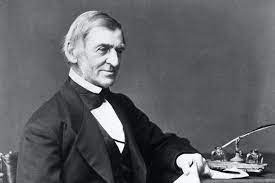Analyze the theme of individualism in the works of Ralph Waldo Emerson
Analyze the theme of individualism in the works of Ralph Waldo Emerson-How does Ralph Waldo Emerson define individualism?, What is the theme of individualism and independence in Self-Reliance by Ralph Waldo Emerson?, What are the themes of individualism?, What themes did Ralph Waldo Emerson write about?,Ralph Waldo Emerson, a prominent figure in the American Transcendentalist movement, extensively explored the theme of individualism throughout his body of work. Across his essays, lectures, and poems, Emerson advocated for self-reliance, nonconformity, and the pursuit of personal truth. His writings aimed to inspire individuals to embrace their uniqueness, break away from societal norms, and foster a deeper connection with their inner selves. Emerson’s concept of individualism encompasses notions of independence, creativity, and spiritual autonomy, as evident in key works such as “Self-Reliance,” “Nature,” and “The Poet.”Analyze the theme of individualism in the works of Ralph Waldo Emerson
In “Self-Reliance,” Emerson emphasizes the significance of trusting one’s intuition and inner voice over societal dictates. He urges individuals to express their original thoughts boldly, rejecting conformity and advocating for independence of thought and action. Emerson’s philosophy revolves around the belief that each person possesses a unique perspective and potential that should be nurtured and honored. He encourages individuals to tap into their innate creativity and carve out their own path in life, free from external expectations.
“Nature” further explores Emerson’s conception of individualism by highlighting the interconnectedness between the individual and the natural world. Emerson argues that communion with nature is essential for self-discovery and spiritual growth. By immersing oneself in nature’s beauty and grandeur, one can gain insight into their inner workings and connect with a higher truth. Emerson celebrates the individual’s ability to perceive the divine in nature and draw inspiration from its vastness and complexity, reinforcing the idea that nature serves as a catalyst for self-realization.Analyze the theme of individualism in the works of Ralph Waldo Emerson
Also Read-
- Facts about Ralph Waldo Emerson Of American Poet
- Self-Reliance Essays Summary By Ralph Waldo Emerson
- Discuss the theme of individualism in Ralph Waldo Emerson’s
In “The Poet,” Emerson delves into the role of the artist as a visionary and prophet of individualism. He lauds the poet as a seer who perceives truths beyond the surface of reality and communicates them to humanity through language and imagination. Emerson views the poet as the epitome of individuality, transcending the ego to tap into a collective consciousness that transcends time and space. Through artistic expression, the poet embodies the quest for truth and beauty, affirming the transformative power of creativity.
Throughout his works, Emerson acknowledges the tension between individualism and society, recognizing the challenges of forging one’s own path in a world that often values conformity. However, he urges individuals to resist the pressure to sacrifice their autonomy for acceptance. Emerson’s philosophy of individualism celebrates the inherent dignity and potential of each human soul, emphasizing the importance of thinking for oneself and living in alignment with one’s deepest values.Analyze the theme of individualism in the works of Ralph Waldo Emerson
Conclusion
Ralph Waldo Emerson’s exploration of individualism in his works, including “Self-Reliance,” “Nature,” and “The Poet,” encapsulates a philosophy that celebrates the autonomy, creativity, and spiritual growth of the individual. Through his essays, lectures, and poems, Emerson urges individuals to trust their intuition, break free from societal norms, and forge their own path in pursuit of truth and authenticity.Analyze the theme of individualism in the works of Ralph Waldo Emerson
He emphasizes the interconnectedness between the individual and the natural world, highlighting the role of nature in fostering self-discovery and inspiration. Additionally, Emerson exalts the artist as a visionary embodying the essence of individuality, transcending personal ego to tap into universal truths through creative expression. Despite the challenges of navigating societal pressures, Emerson’s writings serve as a timeless reminder of the importance of self-reliance, nonconformity, and the pursuit of personal growth and fulfillment.
FAQs:
1. How did Ralph Waldo Emerson define individualism?
Ralph Waldo Emerson defined individualism as the belief in the autonomy and unique potential of each individual. He advocated for trusting one’s intuition, breaking away from societal norms, and forging a path of self-discovery and authenticity.
2. What are some key works by Ralph Waldo Emerson that explore the theme of individualism?
Some key works by Ralph Waldo Emerson that explore the theme of individualism include “Self-Reliance,” “Nature,” and “The Poet.” These essays and lectures delve into the importance of self-reliance, the interconnectedness between the individual and nature, and the role of the artist as a visionary of individuality.
3. How did Emerson view the relationship between the individual and society?
Emerson recognized the tension between individualism and society, acknowledging the pressures to conform to societal norms. However, he encouraged individuals to resist conformity and embrace their uniqueness, emphasizing the importance of living in alignment with one’s own values and aspirations.
4. What role does nature play in Emerson’s philosophy of individualism?
Nature plays a significant role in Emerson’s philosophy of individualism as a source of inspiration, self-discovery, and spiritual growth. Emerson believed that communion with nature allowed individuals to connect with their inner selves and perceive universal truths, reinforcing the importance of the individual’s relationship with the natural world.
5. How did Emerson view the role of the artist in relation to individualism?
Emerson viewed the artist, particularly the poet, as a visionary and prophet of individualism. He believed that artists had the ability to transcend personal ego and tap into a collective consciousness, communicating universal truths through creative expression. The artist embodies the essence of individuality, inspiring others to embrace their unique gifts and perspectives.













